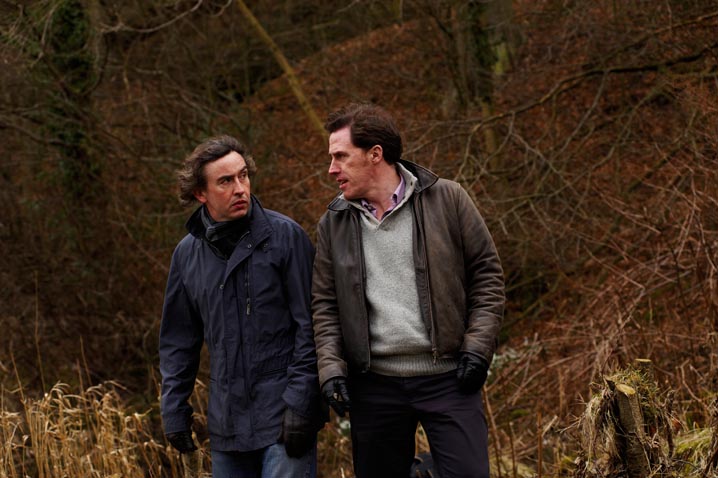WEBTAKES: The Trip
Reviewed by Aaron Cutler
Produced by Andrew Eaton and Melissa Parmenter; directed by Michael Winterbottom; cinematography by Ben Smithard; edited by Mags Arnold and Paul Monaghan; music by Michael Nyman; starring Steve Coogan, Rob Brydon, Claire Keelan, Margo Stilley, Rebecca Johnson, Dolya Gavanski and Kerry Shale. Color, 111 min. An IFC Films release.
The Trip is about a man in transition. The film, edited down from a BBC series, begins with actor-comedian Steve Coogan (playing himself) calling his friend and fellow thespian Rob Brydon (also himself) for a favor. He has to write several restaurant reviews, his girlfriend left him, and he doesn’t want to go alone. As they tour and taste the English countryside, Coogan reveals the estrangement he feels from her, from his son, from his career, and from himself. Brydon, a family man with a rubber face and a ceaseless Al Pacino impression, urges him to feel at peace.
The leads explore themselves through several semiimprovised scenes. But don’t expect a push through the boundaries separating documentary from fiction, like Albert Brooks’s film Real Life, nor the sight of real people acting like assholes to explore the limits of discomfort, as in the TV show Curb Your Enthusiasm. Expect instead a fiction serving as a pretense for the men not just to play themselves, but to be themselves, heartwarming hard talks alternating with stand-up comedy routines. The bulk of their meals consist of celebrity impressions—the (rather obvious) irony of the movie is that Coogan and Brydon seem most comfortably themselves when playing Sean Connery or Anthony Hopkins.
And that’s the major problem with The Trip. It’s too comfortable, too safe, too—here come the words—self-satisfied to give either much lasting pathos or humor. It’s not just that neither Coogan nor the film takes the review assignment seriously; it’s that most of the experiences the men have seem to occur for the sake of reaction shots. A few quick close-ups of plates arranged in the kitchen; the actors taste their meal, declare it’s delicious, and go back to their dueling Michael Caine impersonations. A trip to Coleridge’s home, told mostly through their nodding faces, ends with Coogan admitting that, yep, he’s a wanderer, too.
The shame of it is that the material could easily be better. The evidence is on display during the end credits of 2005’s Tristram Shandy: A Cock & Bull Story, Coogan and Brydon’s previous collaboration with Trip director Michael Winterbottom, when they sat in a movie theater exploring varieties of Pacino; Brydon soon confessed his admiration for Barbra Streisand.
The bite-sized delight of this charade session spots up how endless those in The Trip feel. Yet lest it seem like the boys can work only in small doses, let it also be said that Coogan in particular works brilliantly at length. He’s infinitely more interesting with monstrosity than with regret—one can watch the Trip’s scenes of him pacing across a field, hunched over, calling his teenage spawn to say he misses him, and pine for Coogan’s running BBC-based character Alan Partridge, an ugly, sex-crazed radio host whose sins range from smuggling an extra-large plate into a buffet restaurant to firing employees over the intercom. A trademark Coogan moment involves him saying something horrible, stopping, thinking about it, then trying to make up for it by saying something worse. His characters live painfully aware of their lack of self-awareness; his creased brow and circling hands suggest a brain politely knocking at its skull, then rapping, and crying to be let out.
Coogan’s existential agony caused some wonderful awkwardness in Shandy, as well as in his other Winterbottom/Brydon film, 2002’s 24 Hour Party People (his character tells his wife, when she catches him with a prostitute, “It’s not what you think,” and then, as she walks away, “I love you…”). He’s even played himself well in other people’s films, as when his homophobia stops him from giving another man his phone number in Jarmusch’s Coffee and Cigarettes. But while Jarmusch trapped Coogan inside a static frame and watched him flail within it, here Winterbottom stays close to Coogan for the most part, making the mistake of taking an ironist at his word.
There’s a scene late in The Trip where Coogan and Brydon perform their Michael Caines for a pair of female admirers, audience sit-ins that laugh and clap with delight. But the thing is, the routine isn’t funny—they’re just performing Michael Caine dialog. The scene could be so much more awful, and hilarious, too, if the women weren’t amused, and laughed to please them, or if the men pushed them to laughter to please their own egos. Those scenes would, in fairness, belong to a very different movie, far more painful than the current piece. Yet the more the two men talk calmly about how old they feel (“Everything’s exhausting at our age,” the forty-five-year-old Coogan says), the more this critic pines for exactly that kind of film.
Manohla Dargis, in her New York Times review, writes that a scene of Coogan trying different voices in front of a mirror and disliking them (all set to soft and delicate piano music) emblematizes The Trip’s “sad-funny neediness.” But we’ve seen sad clowns before. What’s recognizable, in a more dangerous way, is a scene where Coogan bemoans losing roles to fellow actor Michael Sheen (Frost/Nixon). Sheen’s brilliant, Brydon says, to which Coogan cries, “I’M FUCKING BRILLIANT!” The actor’s cheeks spring back while his eyes lunge forward; it’s the look of a man trying to protect himself from accusations of mediocrity (especially his own), and the camera stays far enough away from him for us to see the leaps. The shot is at once touching, pathetic, uncomfortable, and funny. It’s the closest the film comes to stepping out of itself.
Aaron Cutler’s film writings can be found at aaroncutler.tumblr.com.
Copyright © 2011 by Cineaste Magazine
Cineaste, Vol. XXXVI, No. 4

